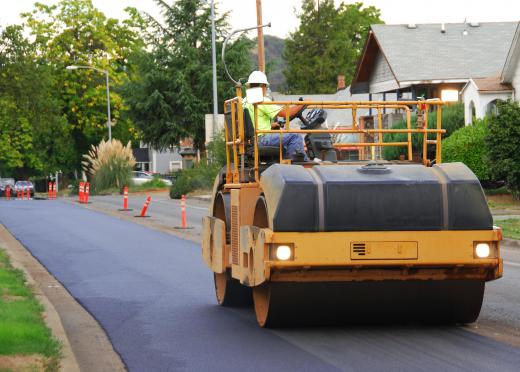A construction barrier is any sort of barrier that is used to keep unauthorized personnel out of a construction area. This may include the use of fencing, concrete barriers or even warning tape, depending on the situation and the level of danger involved should anyone wander into the area. A construction barrier can also be used to help protect green areas from disturbance by heavy machinery and foot traffic.
While most construction barriers are temporary in nature, there are some that can be considered permanent. A permanent construction barrier is one of the types of barriers that stays up for a significant period of time, perhaps even after construction is completed; usually some sort of fencing. During the construction, it serves as a natural barrier. After the construction, it still serves as a divider, privacy or sound barrier. These are common in residential construction zones.

The other type of barrier is the temporary construction barrier. These are often put up very quickly and, while they may not provide as much security as a permanent barrier, can provide enough of a deterrent to keep all but the most determined of people out of a construction zone. They normally include chain link fencing, perhaps some concrete barriers, and perhaps even some segmented privacy fencing as well. Barbed wire at the top of the fence may be used to discourage entry when theft is a concern.

Some construction barrier types are made, or at least enhanced, with highly reflective materials to make them even more visible. This is especially important for road construction, where some of the work may be done at night. Alerting motorists through highly reflective materials is a good way to keep both the workers and the motorists safe. Some of these barriers include folding barricades, which may have their own battery system and flashing lights to further provide visibility to the potential hazard.

Many contractors may have their own sets of construction barriers. However, for those who do not and who only need them every once in a while, there are companies that specialize solely in the renting and delivery of these barriers. This is a cost-effective alternative for those who may need different types of barriers depending on the job. When done, the company will usually arrange for pick up of the barriers as well.
While no construction barrier is guaranteed to keep everyone out or make sure everyone is aware of the construction, there could be a lot more harm done if they were not present. In most cases, local, state, or even national regulations may require the use of these barriers when heavy construction is going on. For more information, consult your local permitting office to know what you will need for a particular job.
